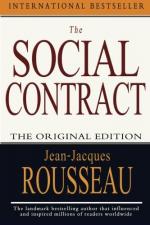
|
| Name: _________________________ | Period: ___________________ |
This test consists of 15 multiple choice questions and 5 short answer questions.
Multiple Choice Questions
1. The author believes he is a citizen of which of the following?
(a) Tyrannical state.
(b) Monarchical state.
(c) Free state.
(d) Republican state.
2. According to the author, no man has any natural authority over which of the following?
(a) His state.
(b) His family.
(c) His beliefs.
(d) His fellows.
3. The author states that the second aspect of government is that it exists for the good of which of the following?
(a) The community.
(b) The individual.
(c) The Sovereign.
(d) The state.
4. The author believes that men are not naturally which of the following?
(a) Enemies.
(b) Violent.
(c) Social.
(d) Powerful.
5. The will of all is a conglomeration of which of the following?
(a) Private companies.
(b) Private charities.
(c) Private interests.
(d) Private needs.
6. According to the author, the state does not have a right to take the life of an individual who threatens which of the following?
(a) Property.
(b) Other individuals.
(c) National defense.
(d) Ideas and technology.
7. Which of the following best describes Grotius?
(a) A religious philosopher.
(b) A family philosopher.
(c) A social philosopher.
(d) A scientific philosopher.
8. The author states that every free act must have two causes; moral and which of the following?
(a) Legal.
(b) Physical.
(c) Spiritual.
(d) Psychological.
9. The right of which of the following terms in the first degree refers to private property rights under the state?
(a) Possession.
(b) Handling.
(c) Ownership.
(d) Lawfulness.
10. The first type of laws govern the interaction between the state and which of the following?
(a) The people.
(b) The Sovereign.
(c) The world.
(d) The community.
11. When men work together in the way that the author suggests, it produces what type of authority?
(a) True moral and collective authority.
(b) True moral and compact authority.
(c) True moral and majority authority.
(d) True moral and malignant authority.
12. According to the author, which of the following situation takes place within a state that is plagued by uncertainty?
(a) It fixes itself.
(b) It falls apart.
(c) It is conquered.
(d) There is a revolution.
13. The term, inherent in anarchy, refers to which of the following?
(a) Self-destruction.
(b) Ordering of men by power.
(c) Lawlessness.
(d) Lack of will.
14. The author states that moral equality must be substituted for which of the following in a social contract?
(a) Possessor inequality.
(b) Physical inequality.
(c) Property inequality.
(d) Social inequality.
15. According to the author, the legislator must appeal to an authority who can bear men away without which of the following elements?
(a) Violence.
(b) Harm.
(c) Concern.
(d) Selfishness.
Short Answer Questions
1. Which of the following does the author believes to be few in number in a well-ordered state?
2. The author believes that every individual has the responsibility to die in defense of which of the following?
3. If the natural circumstances are not taken into account by the legislator, what type of status will the state be in?
4. Who is Grotius?
5. The Sovereign Will is the expression of desired action to meet which of the following?
|
This section contains 490 words (approx. 2 pages at 300 words per page) |

|




